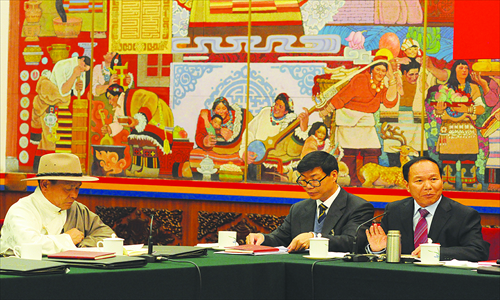Tibetan separatists 'inciting murders'

Officials in Southwest China's Tibet Autonomous Region Friday slammed overseas Tibetan separatists for instigating the self-immolation of Tibetans in China in order to achieve their political goals.
At a group discussion on the sidelines of the 18th National Congress of the Communist Party of China, Losang Gyaltsen, vice chairman of the Tibet regional government, said it is deplorable that Tibetan separatists have been praising self-immolation as being heroic and pushing more Tibetans to go to these extreme measures.
"The Dalai Lama clique and overseas Tibetan separatists have been sacrificing other people's lives for their own secret political aims," he said, in response to a reporter's inquiry about reported recent self-immolation cases in Tibetan areas, adding that "these are murders."
According to AP, dozens of Tibetans have set themselves on fire in western China over the past year because of "desperation over tighter religious and social controls."
Losang Gyaltsen said the government has been working hard to raise Tibetans' living standards. While protecting the local people's religious freedom, the government has also been managing religious affairs in accordance with the law.
Qiangba Puncog, chairman of the Standing Committee of the People's Congress of Tibet, said none of the monks in over 1,700 temples in the autonomous region had self-immolated.
He admitted that one such case did take place in Lhasa, but pointed out the person involved came from outside the region and was connected with overseas separatists.
Lhasa's Party chief Qizhala said that in the past year, the city has been strengthening efforts to prevent similar cases from happening.
Outsiders entering the city must register with their ID information. Security checks are conducted at border entry points as well as railway and bus stations. Emergency personnel are also on hand should such tragedies happen again, according to Qizhala.
Self-immolations have occurred in several temples in Tibetan areas outside the autonomous region, but these were also found to have been incited by overseas separatists, Qiangba Puncog said.
"Tibetan Buddhism has always been opposed to taking a life. Propaganda from outside that paints self-immolators as heroes is against religious teachings," Qiangba Puncog said.
Tibetan people have been sharing the benefits from China's social and economic progress and most are opposed to self-immolation, he said.
In a separate group discussion, Nur Bekri, chairman of the regional government of the Xinjiang Uyghur Autonomous Region, said the regional government has been cracking down on terrorist activities that threaten people's lives and the country's national security.
One pleasing trend is that more ordinary people have been joining the authority's efforts to root out terrorists and separatists.
"In the past, information about terrorists in southern Xinjiang was mainly obtained through technical measures by police," he said. "Now more and more people volunteer to report any dangerous activities, and some who were formerly involved in terrorist activities have turned themselves in," said Nur Bekri.